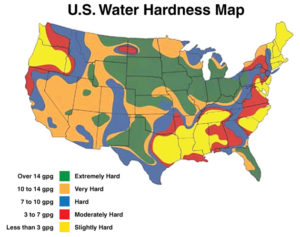What's in your water?
Go to the Environmental Working Groups web site EWG.org Then scroll down to the tab that has EWG National Tap Water Data Base. How safe is your drinking water?
Scale deposits are a typical sign of Hard water
Water described as "hard" means it is high in dissolved minerals, specifically calcium and magnesium. Hard water is a nuisance because of its tendency to cause mineral buildup in water pipes and heating systems, or Dry skin and hair, bathtub ring, spots on glass, silverware and fixtures, dull, dingy clothing, disappointing performance and a shortened life expectancy of water-using appliances are all problems frequently caused by hard water.detergent performance when compared with soft water.

Bacteria & Virus Issues
According to the Centers for Disease Control and Prevention, there could be as many as 12 million cases of waterborne acute gastrointestinal illness annually in the United States alone. These illnesses are frequently caused by bacteria, viruses and protozoa that make their way into the water supply. Even well-operated, state-of-the-art treatment plants cannot ensure that drinking water is entirely free of microbial pathogens.
Taste & Odor Issues
Some of the culprits behind bad tasting, smelly drinking water could be:
- Hydrogen Sulfide, which can produce a rotten egg smell;
- Dissolved solids which cause a musty, earthy wood smell;
- Chlorine used in the municipal water treatment process;
- Metallic tastes and smells from mercury, lead, arsenic and iron seeping into the water supply.
